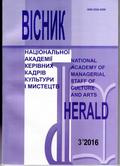КОД І КУЛЬТУРНО-ІСТОРИЧНІ ТРАДИЦІЇ "ПОДВІЙНОГО КОДУВАННЯ" У ФОЛЬКЛОРІ
Code and cultural and historical tradition of "double oding" in folklore
Author(s): Olena AphoninaSubject(s): Theatre, Dance, Performing Arts, Customs / Folklore, Semiology, Ethics / Practical Philosophy, Cultural Anthropology / Ethnology
Published by: Національна академія керівних кадрів культури і мистецтв
Keywords: code; double coding; folklore; folkkod; song; fairy tale; dance
Summary/Abstract: Purpose of the research is to define theoretical uestions aimed at identifying folklore codes and "double coding" traditions in the folk art from the point of view of ifferent concepts and paradigms in the scientific literature. The research methodology is the use of the systematic approach, which reveals features of folklore codes and cultural and historical tradi-tions of "double coding" in different genres of folk art and performing. The scientific novelty of this work lies in defining of the folklore (auditory, verbal, visual) codes in different genres of folk art (music, dance, fairy tale and ritual). Through the example of performing folk groups and in the process of "double coding", the study defines the following codes: representation, evocative and intermediate. Conclusions. Based on the study of both theoretical works and practice, it is determined that the folk-image codes are associated with the mythology, history and religion. Folklore codes, as well as other types of codes, have a stable system of signs and symbols, in which they can be transcribed. Ritual actions, games, dances, songs and fairy tales have their own system of codes (images, events, etc.). Codes in a song and fairy tale are defined in the text (images, symbols), codes in music (tunes, intonation), codes in the musical and compositional structures (definable melodies in calendar ritual folklore), in choreography – music and movement codes based on texts and rhythm. Each folklore genre has performance specifics, but there are common traditions, contained in improvisation based on traditional musical and dance styles and stereotypes. "Dou-ble coding" in folklore is a multi-step process of transformation of the information, stored for a long time, constantly transmitted from one generation to the other and varying in details (in music, lyrics and stories, dance accompaniment and moves).
Journal: Вісник Національної академії керівних кадрів культури і мистецтв
- Issue Year: 2016
- Issue No: 3
- Page Range: 45-49
- Page Count: 5
- Language: Ukrainian

